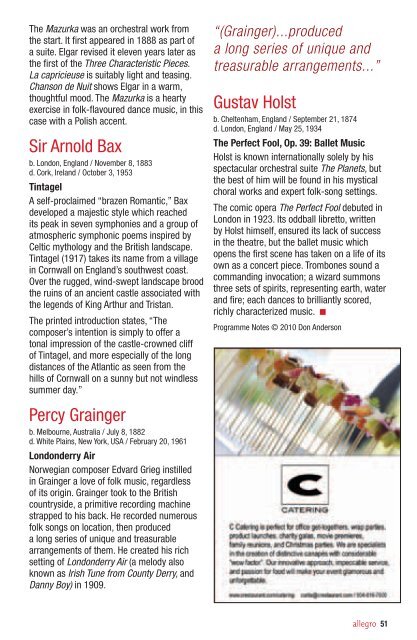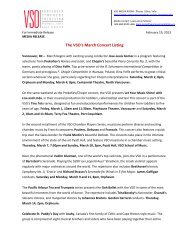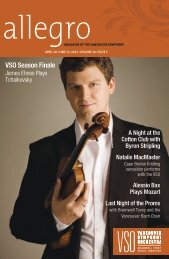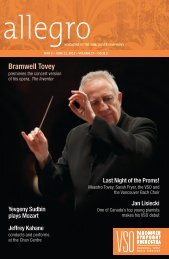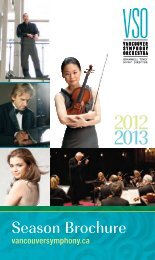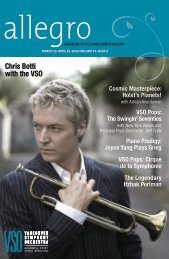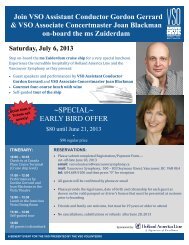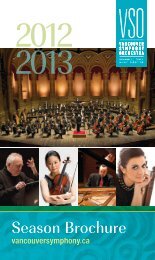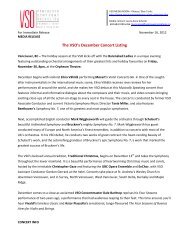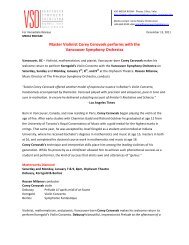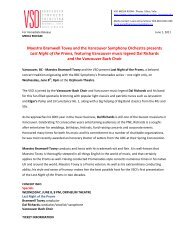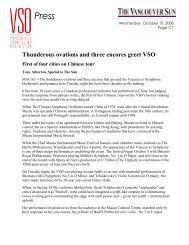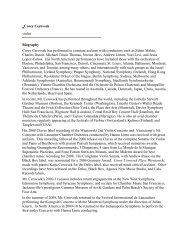issue one - Vancouver Symphony Orchestra
issue one - Vancouver Symphony Orchestra
issue one - Vancouver Symphony Orchestra
You also want an ePaper? Increase the reach of your titles
YUMPU automatically turns print PDFs into web optimized ePapers that Google loves.
The Mazurka was an orchestral work from<br />
the start. It first appeared in 1888 as part of<br />
a suite. Elgar revised it eleven years later as<br />
the first of the Three Characteristic Pieces.<br />
La capricieuse is suitably light and teasing.<br />
Chanson de Nuit shows Elgar in a warm,<br />
thoughtful mood. The Mazurka is a hearty<br />
exercise in folk-flavoured dance music, in this<br />
case with a Polish accent.<br />
Sir Arnold Bax<br />
b. London, England / November 8, 1883<br />
d. Cork, Ireland / October 3, 1953<br />
Tintagel<br />
A self-proclaimed “brazen Romantic,” Bax<br />
developed a majestic style which reached<br />
its peak in seven symphonies and a group of<br />
atmospheric symphonic poems inspired by<br />
Celtic mythology and the British landscape.<br />
Tintagel (1917) takes its name from a village<br />
in Cornwall on England’s southwest coast.<br />
Over the rugged, wind-swept landscape brood<br />
the ruins of an ancient castle associated with<br />
the legends of King Arthur and Tristan.<br />
The printed introduction states, “The<br />
composer’s intention is simply to offer a<br />
tonal impression of the castle-crowned cliff<br />
of Tintagel, and more especially of the long<br />
distances of the Atlantic as seen from the<br />
hills of Cornwall on a sunny but not windless<br />
summer day.”<br />
“(Grainger)...produced<br />
a long series of unique and<br />
treasurable arrangements...”<br />
Gustav Holst<br />
b. Cheltenham, England / September 21, 1874<br />
d. London, England / May 25, 1934<br />
The Perfect Fool, Op. 39: Ballet Music<br />
Holst is known internationally solely by his<br />
spectacular orchestral suite The Planets, but<br />
the best of him will be found in his mystical<br />
choral works and expert folk-song settings.<br />
The comic opera The Perfect Fool debuted in<br />
London in 1923. Its oddball libretto, written<br />
by Holst himself, ensured its lack of success<br />
in the theatre, but the ballet music which<br />
opens the first scene has taken on a life of its<br />
own as a concert piece. Tromb<strong>one</strong>s sound a<br />
commanding invocation; a wizard summons<br />
three sets of spirits, representing earth, water<br />
and fire; each dances to brilliantly scored,<br />
richly characterized music. ■<br />
Programme Notes © 2010 Don Anderson<br />
Percy Grainger<br />
b. Melbourne, Australia / July 8, 1882<br />
d. White Plains, New York, USA / February 20, 1961<br />
Londonderry Air<br />
Norwegian composer Edvard Grieg instilled<br />
in Grainger a love of folk music, regardless<br />
of its origin. Grainger took to the British<br />
countryside, a primitive recording machine<br />
strapped to his back. He recorded numerous<br />
folk songs on location, then produced<br />
a long series of unique and treasurable<br />
arrangements of them. He created his rich<br />
setting of Londonderry Air (a melody also<br />
known as Irish Tune from County Derry, and<br />
Danny Boy) in 1909.<br />
allegro 51


